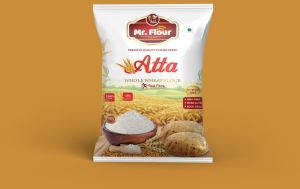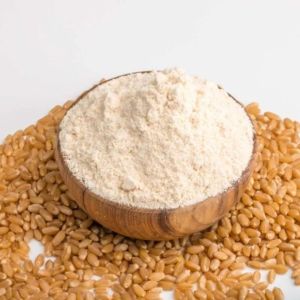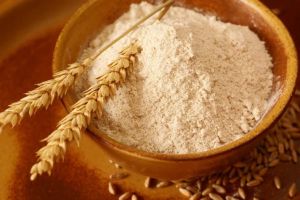
Wheat Flour
30 - 50 Per Kilogram
1 Ton (MOQ)

Wheat Flour
40 - 50 Per Kilogram
100 Kilogram (MOQ)
Best Deals from Aashirvaad Wheat Atta

Wheat Flour
Get Price Quote
100 Metric Ton (MOQ)

Wheat Flour
30 - 60 Per Kilogram
10 Ton (MOQ)

Wheat Flour
25 - 120 Per Bag
5000 Bag (MOQ)

Wheat Flour
50 - 100 Per Kilogram
10 Ton (MOQ)

Wheat Flour
Get Price Quote
100 Ton (MOQ)

Wheat Flour
35 - 40 Per Kilogram
5 Tons (MOQ)
Stoneless wheat flour...with full of nutritions and easy to digest and best flour for Roti

Maida Flour
Get Price Quote
Maida flour is refined and finely milled wheat flour. In the mills, Maida flour is obtained by grinding it on the rollers and by filtering it through a fine mesh. In India, it is used to make a variety of food items like puri, chapatti, paratha, etc. as well as for making pastries, cakes and many different types of bakery items like bread, toast, biscuits, etc. In United State, pastry flour is used in place of Maida flour. Why Our Maida Flour? Obtained after processing quality wheat Finely milled in disinfected conditions Smooth and flawless mesh Available in bulk packing of 50kg HDPE BAG Long shelf life Demanded By Bakeries Homes Restaurants Hotels Caterers

Wheat Flour
35 Per Kilogram
15 Ton (MOQ)

Wheat Flour
34 Per Kilogram
1 Ton (MOQ)

Wheat Flour
30 - 50 Per Bag
5 Ton (MOQ)
Product: Wheat Flour (Atta) Varieties: Whole Wheat Flour (Atta): Used for bread, chapati, and flatbreads. Refined Wheat Flour (Maida): Used for cakes, pastries, and biscuits. Semolina (Sooji): Coarse wheat flour, used for pasta, upma, and cereals. Grade: A Grade: Premium quality, finely milled, free from impurities. B Grade: Standard milling quality for regular consumption. Protein Content: 11-13%Moisture Content: Less than 14%Ash Content: 0.60-0.75%Gluten Content: 9-12% (depending on wheat type) Origin: Madhya Pradesh, Punjab, Haryana, Uttar Pradesh, Rajasthan (India’s key wheat-growing regions) Packaging: Bags: Polypropylene (PP) or multi-layer kraft paper bags. Weight per Bag: Available in 1 kg, 5 kg, 10 kg, 25 kg, and 50 kg options. Labeling: Each bag will display product name (Whole Wheat Flour/Refined Wheat Flour/Semolina), grade, weight, batch number, origin, and custom branding as required. Container Load: 20 ft Container: Can load 19-20 metric tons in 25 kg or 50 kg bags. 40 ft Container: Can load 38-40 metric tons. Price Range: ₹20 to ₹40 per kg (depending on grade and market conditions)MOQ (Minimum Order Quantity): 5 metric tonsDelivery Time: 2-3 weeks from order confirmation Uses: Whole wheat flour (Atta) is used for making bread, chapatis, and flatbreads. Refined flour (Maida) is used in cakes, pastries, biscuits, and confectionery. Semolina (Sooji) is used for pasta, porridge, and cereals. Export Packaging Options: Polypropylene Bags: Strong and durable for bulk orders. Multi-layer Kraft Paper Bags: For retail buyers, eco-friendly, and provides protection against moisture. Custom Packaging: Custom branding and smaller packaging sizes (1 kg, 5 kg) for retail buyers

Wheat Flour
1 Per Kilogram
100 Ton (MOQ)

Wheat Flour
25 - 35 Per Kilogram
1 Ton (MOQ)

Wheat Flour
35 - 40 Per Kilogram
1 Container (MOQ)

Chakki Fresh Atta
Get Price Quote
1 Ton (MOQ)

Wheat Flour
34 Per Kilogram
2000 Kilogram (MOQ)
Wheat Flour is a staple ingredient in kitchens worldwide, derived from grinding wheat grains. It is used to make a wide variety of foods, from bread and cakes to pasta and pastries. Wheat flour is essential for both home cooks and professional bakers, offering versatility and the structure needed in many recipes. Overview: Type: Flour made from ground wheat grains. Varieties: There are different types of wheat flour based on the milling process and protein content. The most common types are: All-Purpose Flour: A versatile flour used in a wide range of recipes. Bread Flour: Higher protein content, ideal for making bread and pizza dough. Whole Wheat Flour: Made from whole wheat grains, offering a richer flavor and higher nutritional value. Cake Flour: A finer, lower-protein flour used in delicate baked goods like cakes and pastries. Self-Rising Flour: Pre-mixed with a leavening agent (baking powder) for convenience in certain baked goods. Color: Ranges from white (for refined flour) to brown (for whole wheat flour), depending on the type of wheat and processing. Texture: Fine powder with varying levels of coarseness, depending on the type. Characteristics: Appearance: Typically off-white or pale beige for refined wheat flour; darker for whole wheat flour. Taste: Neutral, mildly nutty (especially in whole wheat flour), providing a balanced base for most recipes. Aroma: Fresh wheat aroma that enhances baked goods and other dishes. Nutritional Value: Carbohydrates: Wheat flour is primarily composed of carbohydrates, which provide energy. Proteins: Contains gluten proteins, which give dough its elasticity and texture. Fiber: Whole wheat flour is rich in fiber, which aids digestion and promotes satiety. Vitamins and Minerals: Wheat flour provides essential nutrients such as B vitamins (especially B1, B3, and B9), Iron, Magnesium, and Zinc. Gluten Content: Wheat flour contains gluten, a protein that is responsible for the structure and elasticity in dough. Uses: Baking: The most common use for wheat flour is in baking. It is used to make bread, cakes, pastries, cookies, muffins, and pancakes. Bread & Pizza Dough: High-protein wheat flour, like bread flour, is used to create strong, elastic dough that rises well. Cakes & Pastries: Softer flours like cake flour are used to produce delicate, tender cakes and pastries. Pasta: Wheat flour is a primary ingredient in making fresh pasta and noodles. Cooking: Wheat flour is used as a thickening agent in soups, sauces, and gravies. It’s also used for making batters for frying (e.g., fried chicken, tempura). Tortillas & Flatbreads: Whole wheat or refined flour is used to make various traditional flatbreads and tortillas, common in Middle Eastern, Mexican, and Indian cuisines. Coating & Binding: It is used to coat foods before frying or to bind ingredients together in dishes like meatballs or veggie burgers. Traditional Recipes: Wheat flour is essential in many cultural dishes, from naan and roti in South Asia to crepes in France and pasta in Italy. Storage: Shelf Life: White wheat flour has a long shelf life (up to a year or more) when stored in a cool, dry place. Whole wheat flour has a shorter shelf life due to the presence of oils in the wheat germ, which can cause it to go rancid faster. Refrigeration: To extend freshness, especially for whole wheat flour, it can be stored in the refrigerator or freezer. Packaging: Available in various packaging sizes, from small bags for home use to bulk packaging for industrial use. Health Benefits: Whole Wheat Flour: Higher in fiber, vitamins, and minerals compared to refined wheat flour, promoting digestive health and providing longer-lasting energy. Rich in Antioxidants: Whole wheat flour contains antioxidants, which can help reduce oxidative stress and inflammation. Supports Healthy Digestion: The fiber in whole wheat flour supports gut health and may help with digestion and maintaining healthy blood sugar levels. Health Cons

Maida Flour
Get Price Quote
1 Ton (MOQ)

Wheat Flour
36 Per Kilogram
500 Kilogram (MOQ)

Wheat Flour
Get Price Quote
10 Container (MOQ)